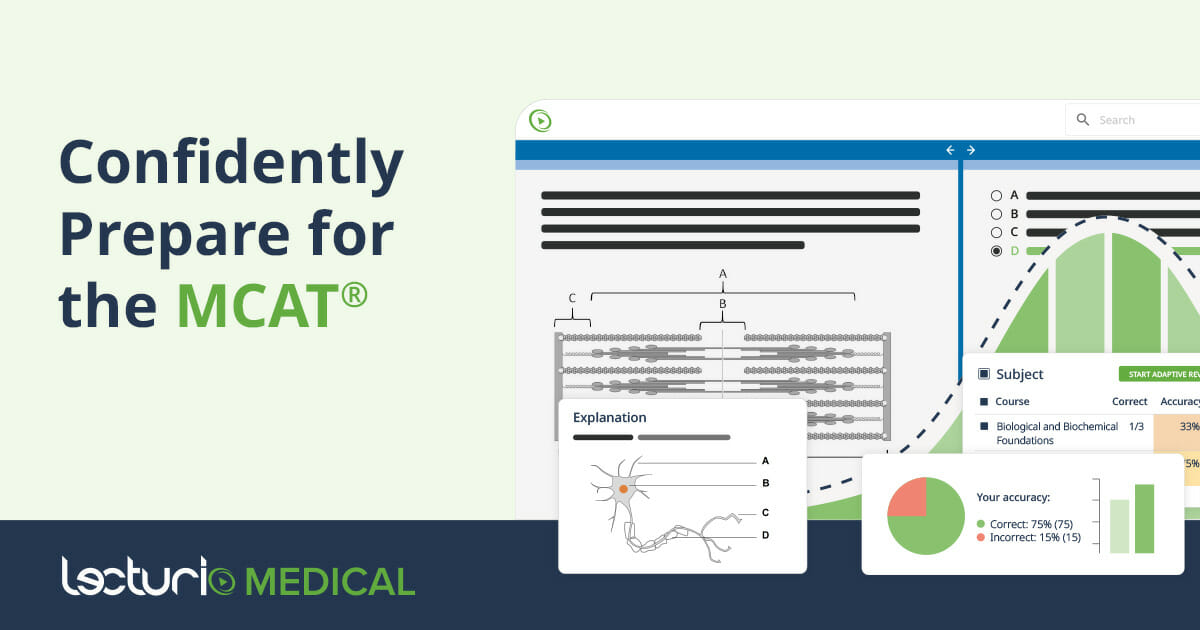What is the MCAT?
I’m sure you’ve heard of the MCAT. But do you know what MCAT stands for and how it works?
The MCAT stands for the Medical College Admission Test. It is an entrance exam taken for individuals planning to go to medical school in the United States, Canada, Australia, and the Caribbean Islands. The exam consists of five sections, with varying amounts of questions and times allotted per section.
- Chemical and Physical Foundations of Biological Systems: Consists of 59 questions to answer within 95 minutes. Questions in this section are based on chemistry and physics in relation to biological science and systems, as well as understanding, interpreting, and reasoning through research material.
- Critical Analysis and Reasoning Skills (CARS): Consists of 53 questions to answer within 90 minutes. Questions in this section test verbal reasoning and reading comprehension through 500-900-word reading passages.
- Biological and Biochemical Foundations of Living Systems: Consists of 59 questions to answer within 95 minutes. This section pertains to biology and biochemistry while understanding principles of organic and inorganic chemistry. Research methods are also tested in this section.
- Psychological, Social, and Biological Foundations of Behavior: Consists of 59 questions to answer within 95 minutes. This section focuses on psychology and sociology in relation to understanding how they affect health and behavior.
The entire exam runs for an approximate total of 7.5 hours including breaks. Each section is scored on a three-digit point scale ranging from 118 to 132, with 125 the median score, and the sum of all the scores range from 427 to 528, with 500 the median score.
Many undergraduate students prepare for the MCAT during their third year of college in order to apply to medical school the following year before graduating. The MCAT plays a major role in medical school admissions, which is why many students try to prepare for it as best they can.

Unlock Your Best Score with the New Lecturio MCAT® Platform
A dedicated new product with high-yield videos, courses, and a smart Qbank.
How to Study for the MCAT
Getting ready to study for the MCAT can be overwhelming. You might wonder, “where do I even begin?” The essential steps include making a schedule, finding resources, and taking practice tests.
How long to study for the MCAT: making a study schedule
When preparing to study for the MCAT, it’s important to not only make a study schedule, but also to make a timeline. A timeline consists of when you would like to take the exam before applying to medical school. It is common for pre-med students to take the exam before their last year of undergraduate coursework in order to submit their scores along with their applications. After deciding when you would like to take your test, students then prepare a study schedule for the MCAT for a few months. How many months? It’s really up to you! Some students are able to study while in school, others prefer to take time off to study for the exam. There is no right or wrong length of time; it all depends on what will best prepare you for the test.
While a 3-month (12-week) study schedule is a popular timeline for students studying full-time, a successful plan can range from 3 to 6 months.
- 3-Month Plan (Full-Time Study): Best for students who can dedicate 25-40 hours per week.
- 4-6 Month Plan (Part-Time Study): A more realistic timeline for students who are also taking classes, working, or have other commitments.
If you are still unsure about how to schedule yourself, just jump right to it! A good way to determine how long you may need to study for the MCAT is by taking a practice test to get a baseline score, and then set a timeline to work your way up to your desired score. This is all dependent on what you want to score and what sections you need to work on, and some section scores may be easier to improve than others.
Instead of creating a rigid, hour-by-hour schedule, focus on building flexible study blocks. A typical study day can be broken into two or three blocks of 2-3 hours each. For example:
- Morning Block (Content Review): Spend 2-3 hours reviewing a specific topic (e.g., Metabolism). Use a mix of resources like textbooks, videos, and flashcards for active learning.
- Afternoon Block (Practice Questions): Dedicate 2-3 hours to practice problems related to the morning’s topic. This immediately reinforces what you’ve just learned.
- Evening Block (Review/CARS): Use this shorter block to review mistakes from your practice questions or work on CARS passages.
This block method ensures you are both learning and applying knowledge daily, which is far more effective than just passive review.
While studying for the MCAT it is good to also include days off for relaxation. The stress of studying for a lengthy exam such as the MCAT can take a toll on your well-being, especially if you feel you are not seeing results. It’s important to remember that mindset is half the battle in taking exams, and breaks are a good way to relieve burn out and remember there is more to you than studying.
How to do well on the MCAT
In order to make a delicious cake you need to have a great recipe and the right ingredients. In order to do well on the MCAT you need to not only have a good plan, but also the right resources! After determining how long you want to study for the MCAT and your schedule, it’s a good idea to also pick the resources that work best for you and your studying and learning style.
Are there any classes I should take before the MCAT? Should I take a prep course or self-study?
It is best to first get an idea of how to get through all the content for the exam, which includes deciding between taking a prep course or studying independently. Many of the subjects on the MCAT are included in typical pre-medical coursework, and many students have been exposed to them. However, further preparation is needed to understand the exam and what it is testing. Many students can self-study for the exam using books and other resources. Others may find that prep courses such as the Princeton Review help arrange the content in an interactive lecture-like setting. It’s all a matter of preference, really. It’s good to note that most students try to take the MCAT after completing the majority of their pre-medical prerequisite coursework in order to gain exposure to some of the content tested on the exam. Classes such as organic chemistry, physics, and psychology are typically included in pre-medical curricula and are beneficial to have completed before taking the MCAT.
What resources should I use for the MCAT?
Primary resources used in studying for the MCAT include review books, videos, practice tests, and using a flashcard system.
- Review books are helpful if you need a refresher on the material or are unfamiliar with certain subjects. However, while reading review books can aid in understanding exam topics, it can become mundane reading things so passively and can lead to a loss of productivity.
- This is similar to watching videos: Both reading and watching videos are informational but can also lead to overload, including low-yield topics, which can be easy to zone out on and lose focus.
- Practice tests, on the other hand, are extremely helpful as they not only incorporate content, but also exercise your test-taking ability, which is crucial when taking the MCAT.
- Flashcards are a good way to solidify knowledge and content especially in weaker subject areas. Flashcards can be pre-downloaded off the internet; however, it is best to create your own so that they are tailored to your own weaknesses. This is especially important over the long duration of your preparation, where it is easy to forget things you learned early in your studies.
How many practice tests should I take before the actual MCAT?
It’s a good idea to take practice tests in preparation for the MCAT to get a better idea of your personal performance and how to reach your goal score. It really depends on how you score on your first practice test and what you want to ultimately score. ‘The more (tests) the merrier’ may apply in this case, as practice tests can train your brain in understanding the language of the exam and how they ask questions. Most students try to take five to eight full-length practice tests prior to sitting for the MCAT. This range may vary based on your personal goals, but as long as you thoroughly review the tests and understand your answers and mistakes, you should be able to take the exam with confidence!
You can purchase practice tests from prep course companies or from online question banks. The Association of American Medical Colleges (AAMC) also has testing resources that are similar to the MCAT itself as many of their questions reflect official exam questions, making them a great staple resource to use.
All of the resources mentioned are helpful in preparing for the MCAT, whether you find them on your own or in a prep course that includes such resources. It’s good to note that and practice questions and tests are the most commonly used in terms of understanding both the content and the testing techniques. It’s recommended that those preparing for the exam take the AAMC full-length practice tests toward the end of their study prep to simulate the exam and also to determine your progress before sitting for the test.
How to Pass the MCAT: Preparing for All Aspects
Along with preparing for the exam itself via content and test-taking techniques, time management is also important. It’s important to pace yourself while taking the exam, since it is timed and certain sections such as CARS include reading passages that can take up lots of time to get through on top of answering the other questions. It’s best to practice, practice, practice to get the hang of not only timing yourself for the exam but also in applying the knowledge for the exam itself. It’s good to take practice exams under realistic testing conditions, which includes being strict on the time schedule of the exam for each section. This approach allows you to work your way through it as if you were taking the actual MCAT.
MCAT study tips to do well for a high score
Aside from practicing under testing conditions and timing yourself, other ways to get ready for the big day include:
Keep a record of the type of questions you get wrong. Make a journal and list the types of questions you get wrong when doing questions or taking practice tests. This helps you understand where your weaknesses may lie and indicates what you need to brush up on.
Use the process of elimination. You don’t have to know everything about a question or even have the right answer if you can eliminate the other answer choices and narrow it down or determine the wrong answer choices.
Skip questions when needed. If you are spending lots of time or are stuck on a question, it’s best to skip it for now and answer other ones and cover more ground while the clock is running. Chances are you’ll be able to come back and reread the question better later rather than stay stuck.
Try to plan for test day. When you’re taking practice tests, it is super helpful to take them as you would for the actual exam. From waking up at the time you need to go into the testing center, wearing earplugs, or determining when you will use a break (yes, you get a break, which I strongly encourage to use because it’s a long test), it’s important to mimic the testing conditions so you are able to feel more in the zone on your actual test day.
Final Thoughts
My own time spent on studying for the MCAT included enduring tedious management of details and trying to work on my test-taking abilities and mindset. I knew after taking a few practice exams that I was particularly weak in the CARS section of the MCAT, where I had to spend more time reading passages, trying to absorb the content, and finding my underlying understanding to answer the questions. I had a limited study timeline of about 2 months before trying to get my medical school applications done and sent in early. So, I reorganized myself and spent less time on my strengths, such as the Chemical and Physical Sciences section, and put more effort into the CARS section to boost that part of my MCAT to make for a better average score. I would time myself not just by section for CARS, but per passage to make sure I was reading at a good pace in order to have time to also read the questions and understand what was being asked.
Part of the battle outside of knowledge of content and test-taking abilities involves having a relaxed mindset, which I knew I also had to work on. It’s important to know that the MCAT is not the ‘be all-end all’ in getting into medical school, and at the end of the day, it’s just a test! Easier said than done, but remembering that in the back of my mind lowered my stress levels and helped me have a more relaxed and focused mind rather than dwell on anxiety and the outcomes of the exam. I definitely believe had I been less anxious, I would have done much better on my MCAT. Don’t overthink, answer the question to the best of your ability, and move on!
Preparing for the MCAT is serious business, and many feel like they do not know where to begin. Starting out by taking a practice exam and checking for weak areas is a good place to start. By targeting those weaker subjects through content review and questions, continuing to practice using questions, timing, and application, the exam content can be mastered and scores can increase over time. Practice makes perfect, but remember to take breaks in between to have a rested body and mind for test day.
The MCAT may be an admissions tool by medical schools, but it is not the only aspect of medical school applications. The MCAT provides a numerical score; however, that score does not determine your self worth. Try not to overexert or stress yourself out over an exam. Medical schools look at all applicants holistically. The score does not define you!




